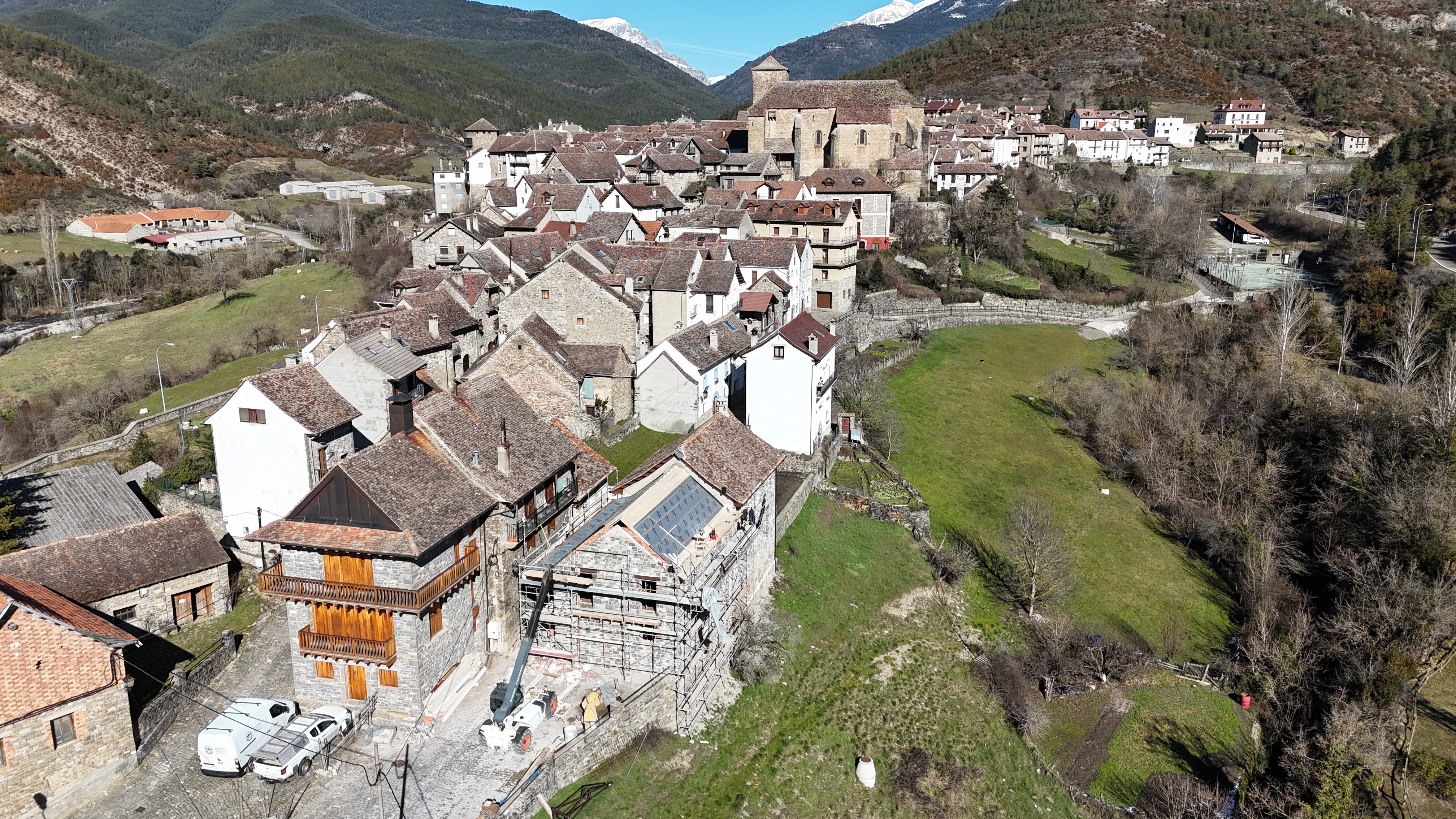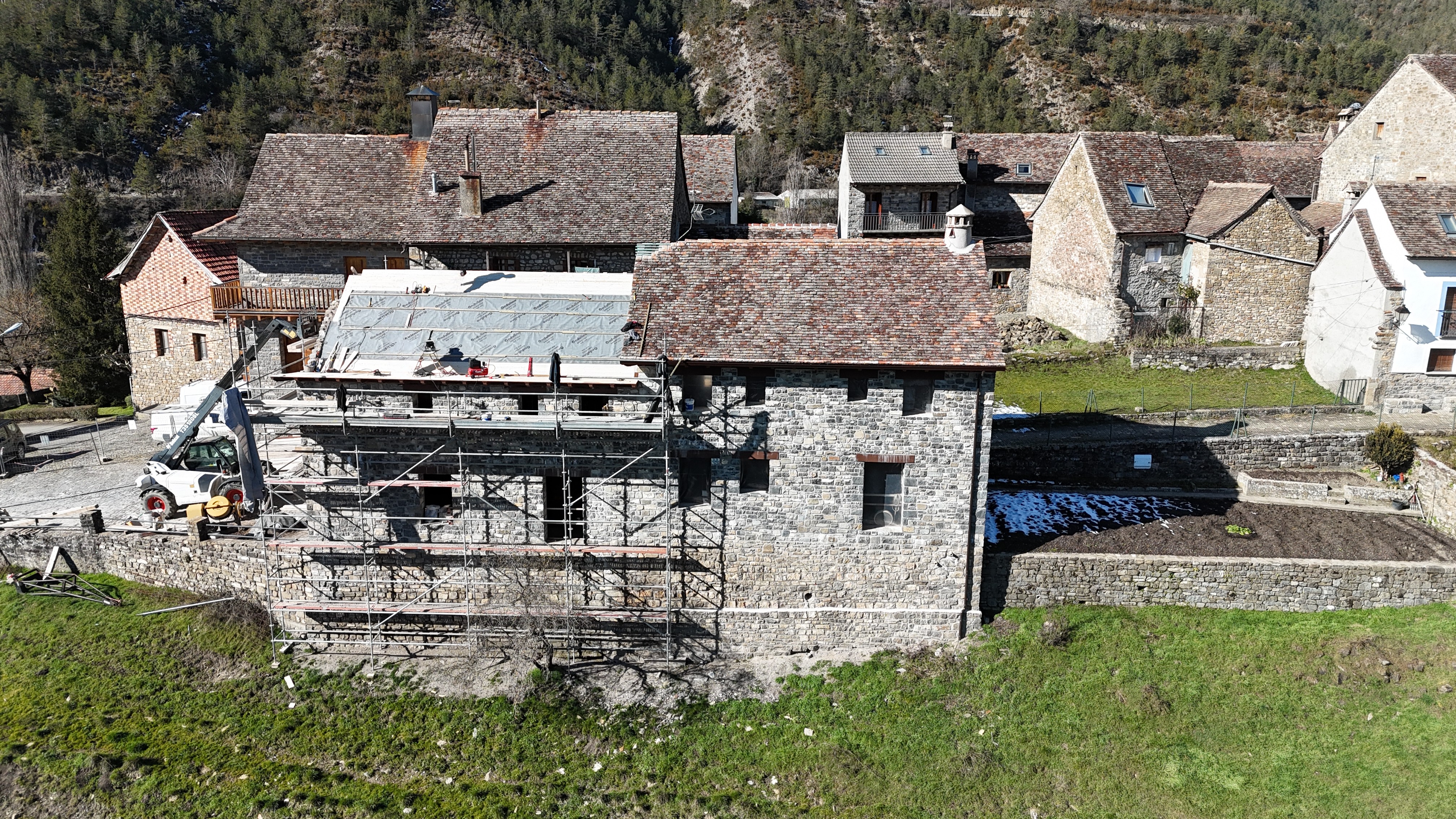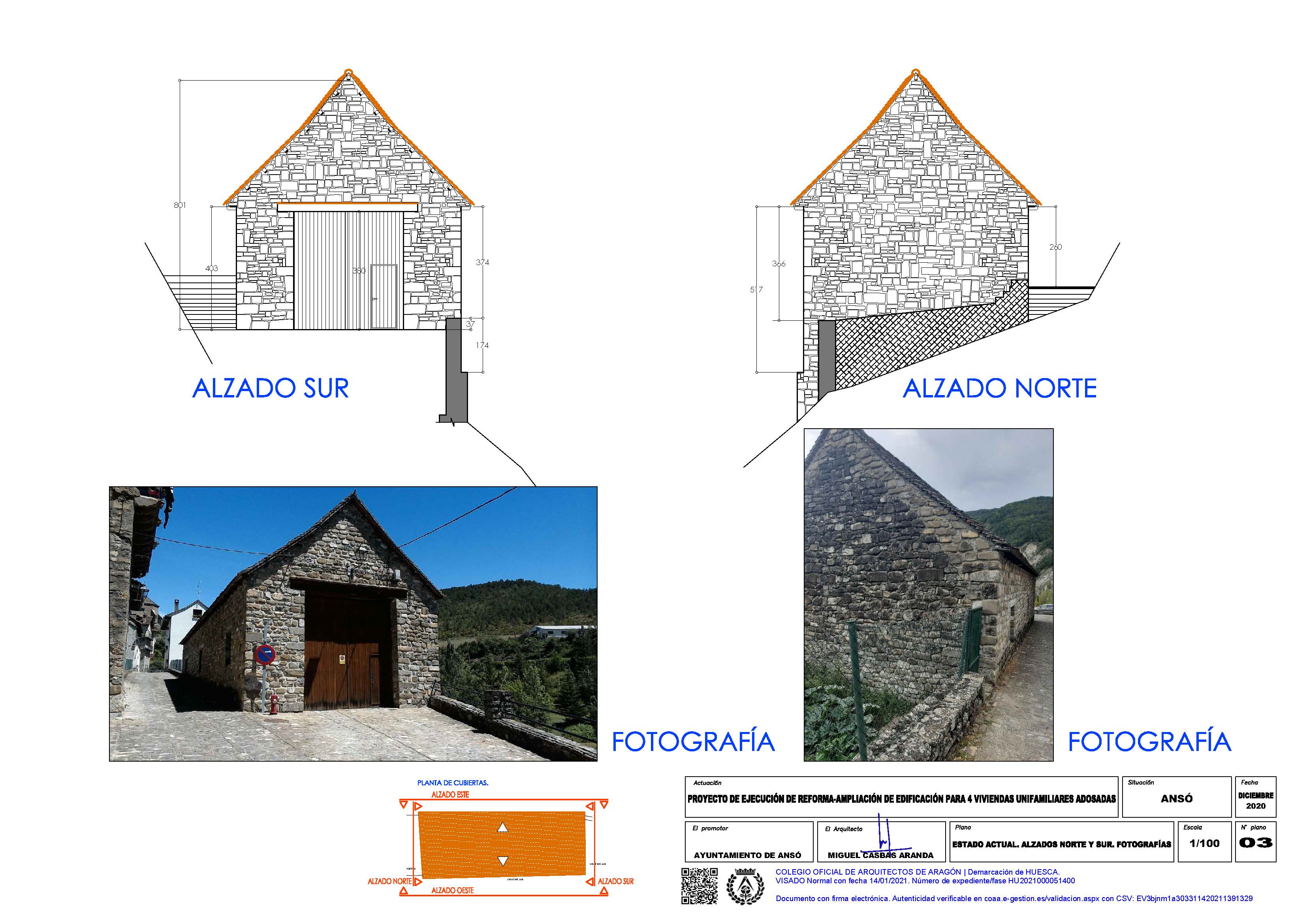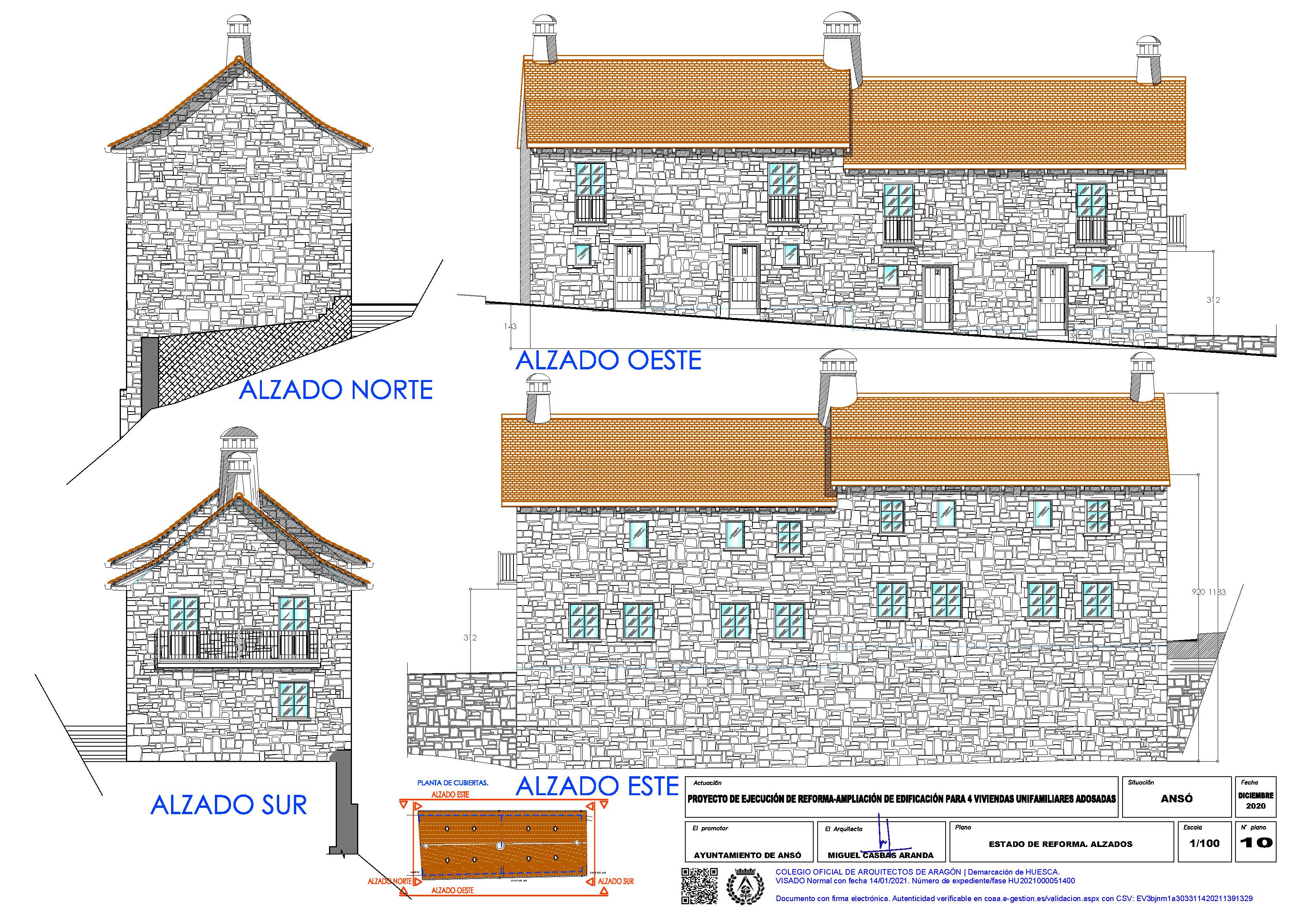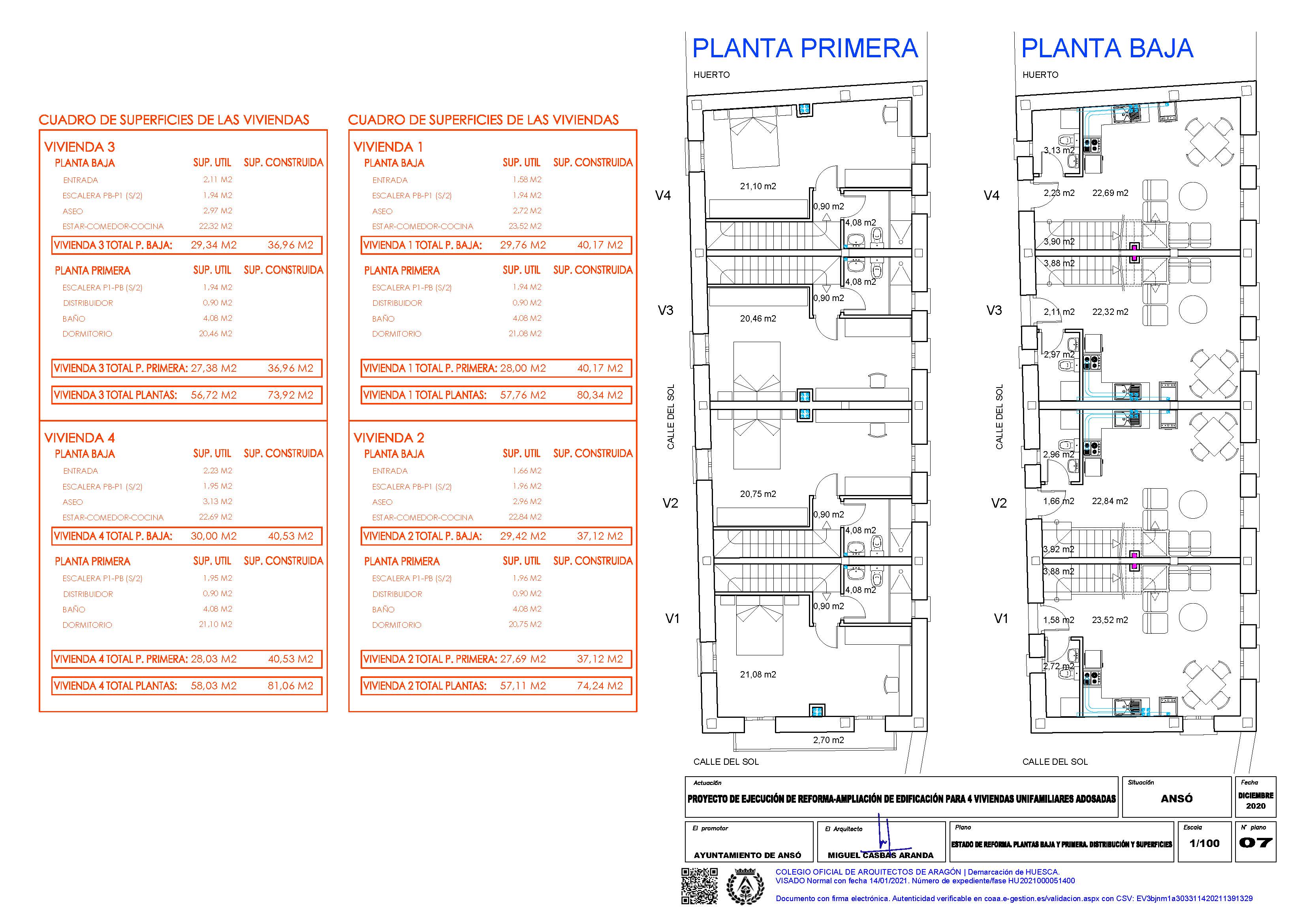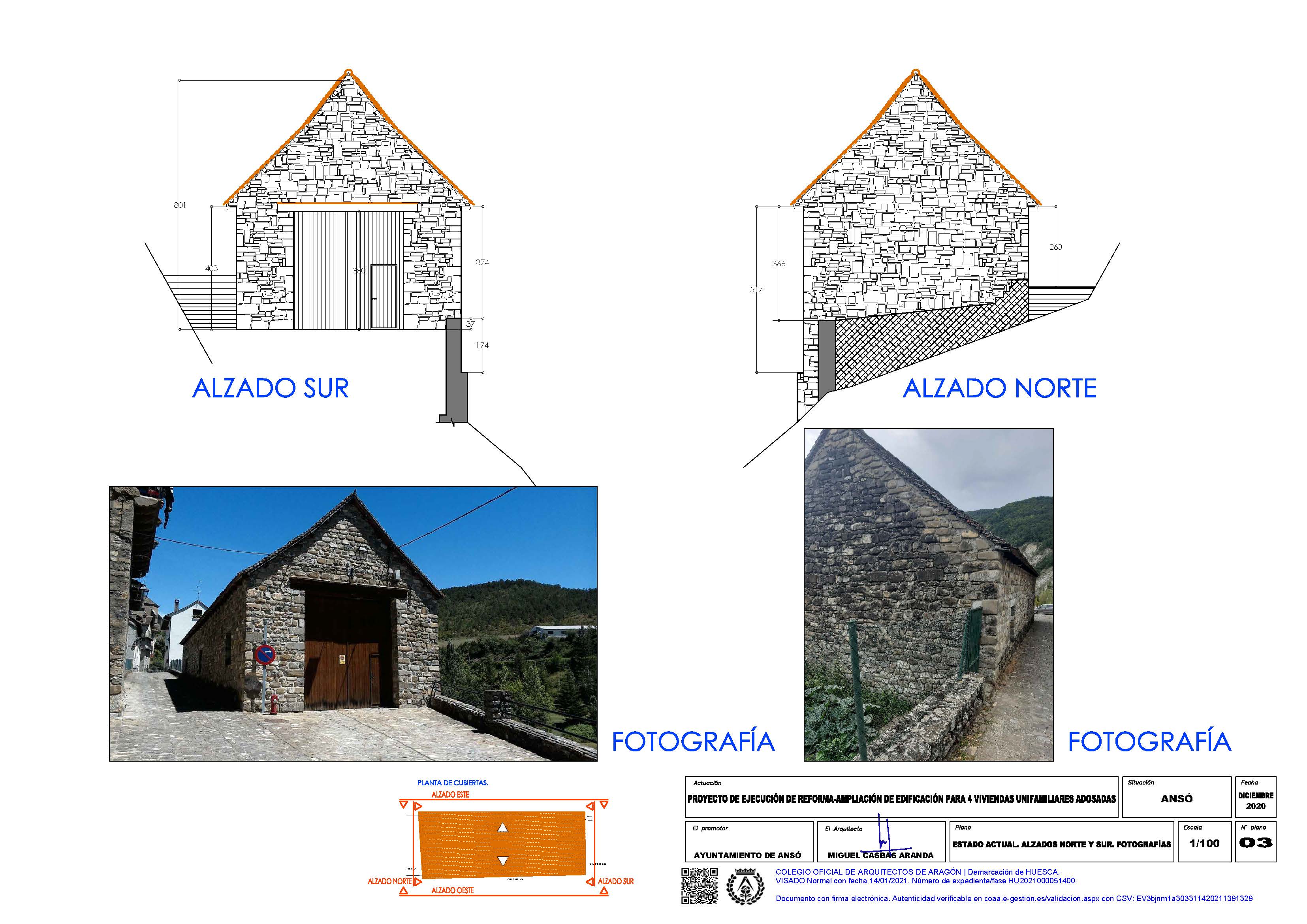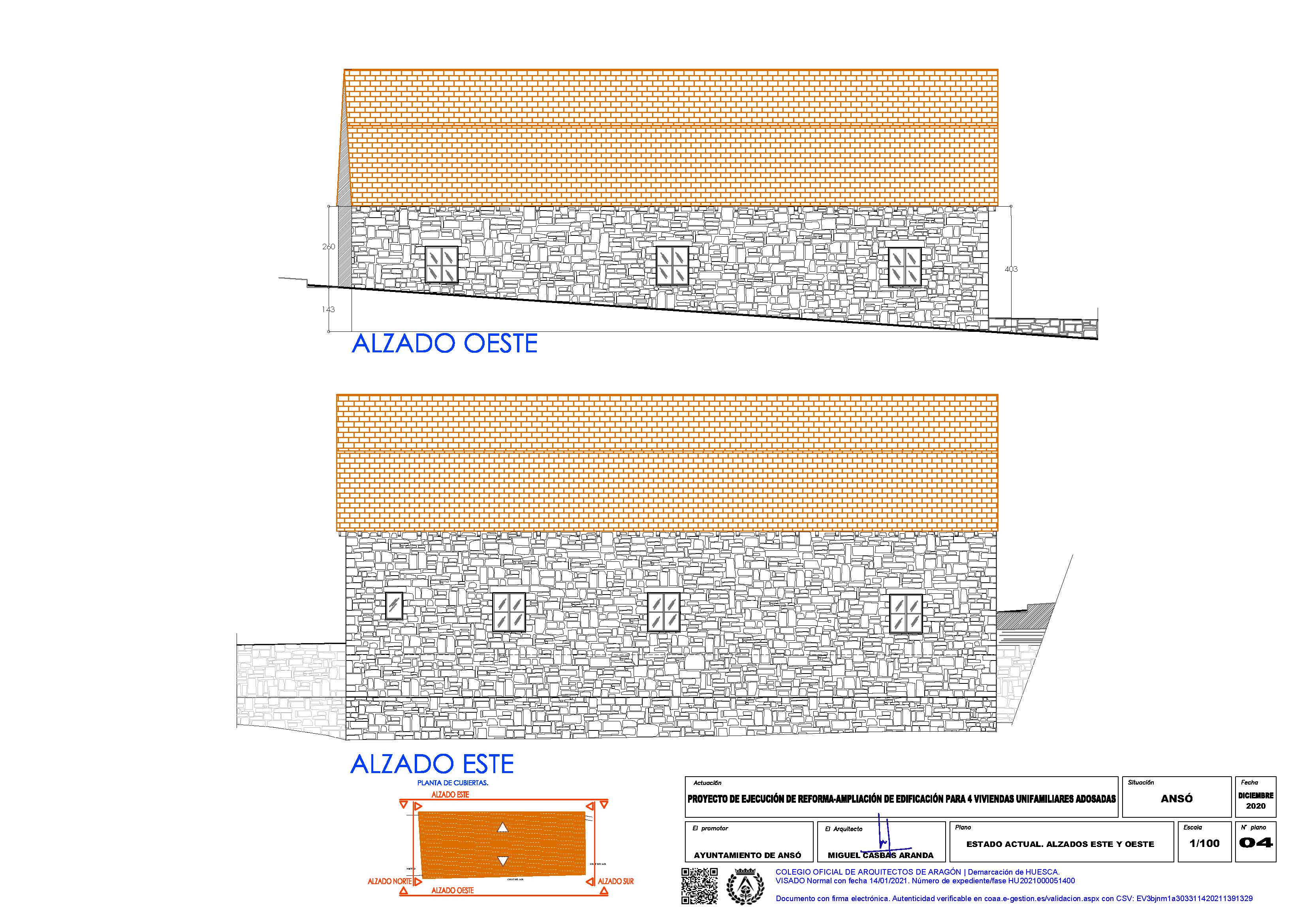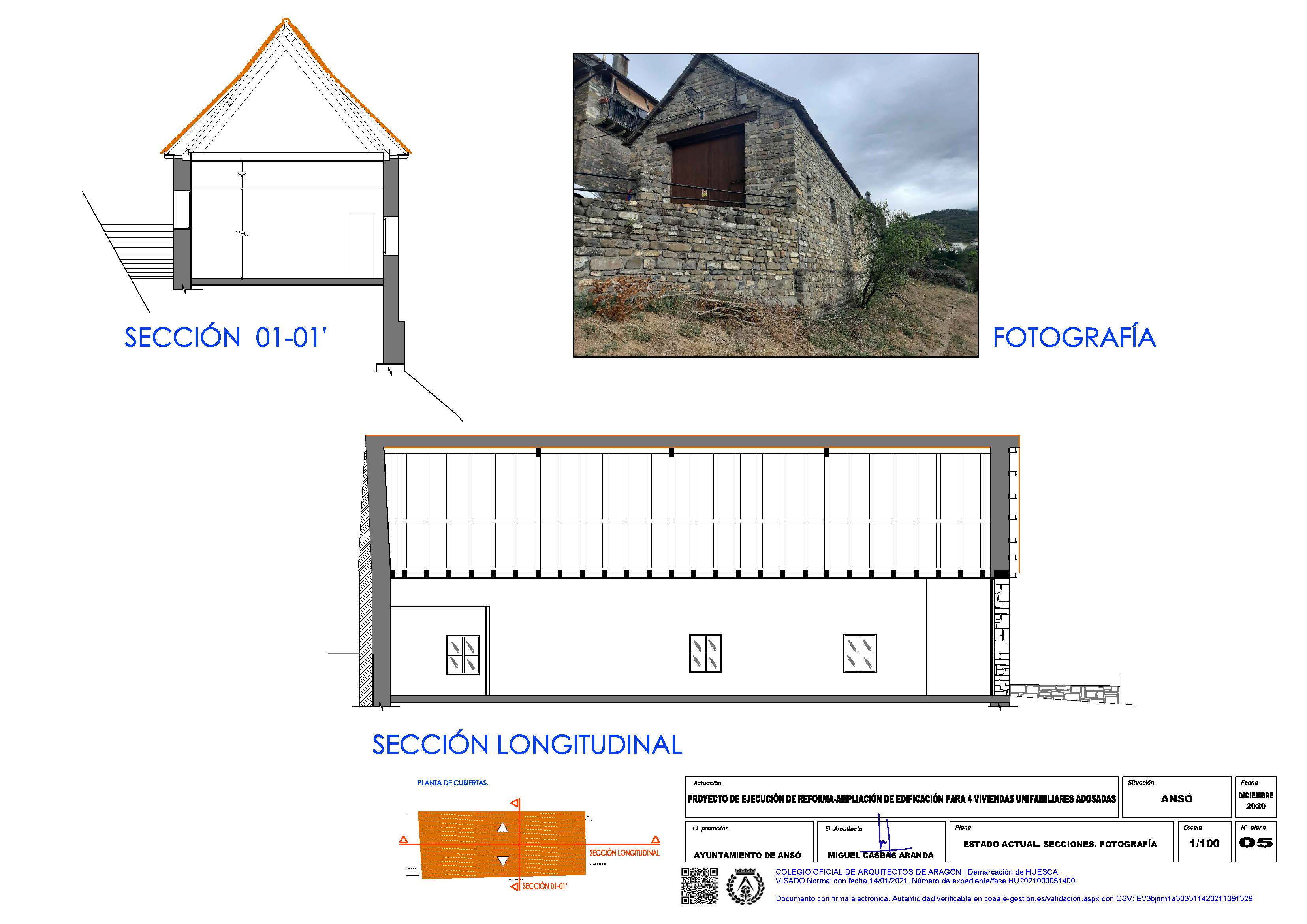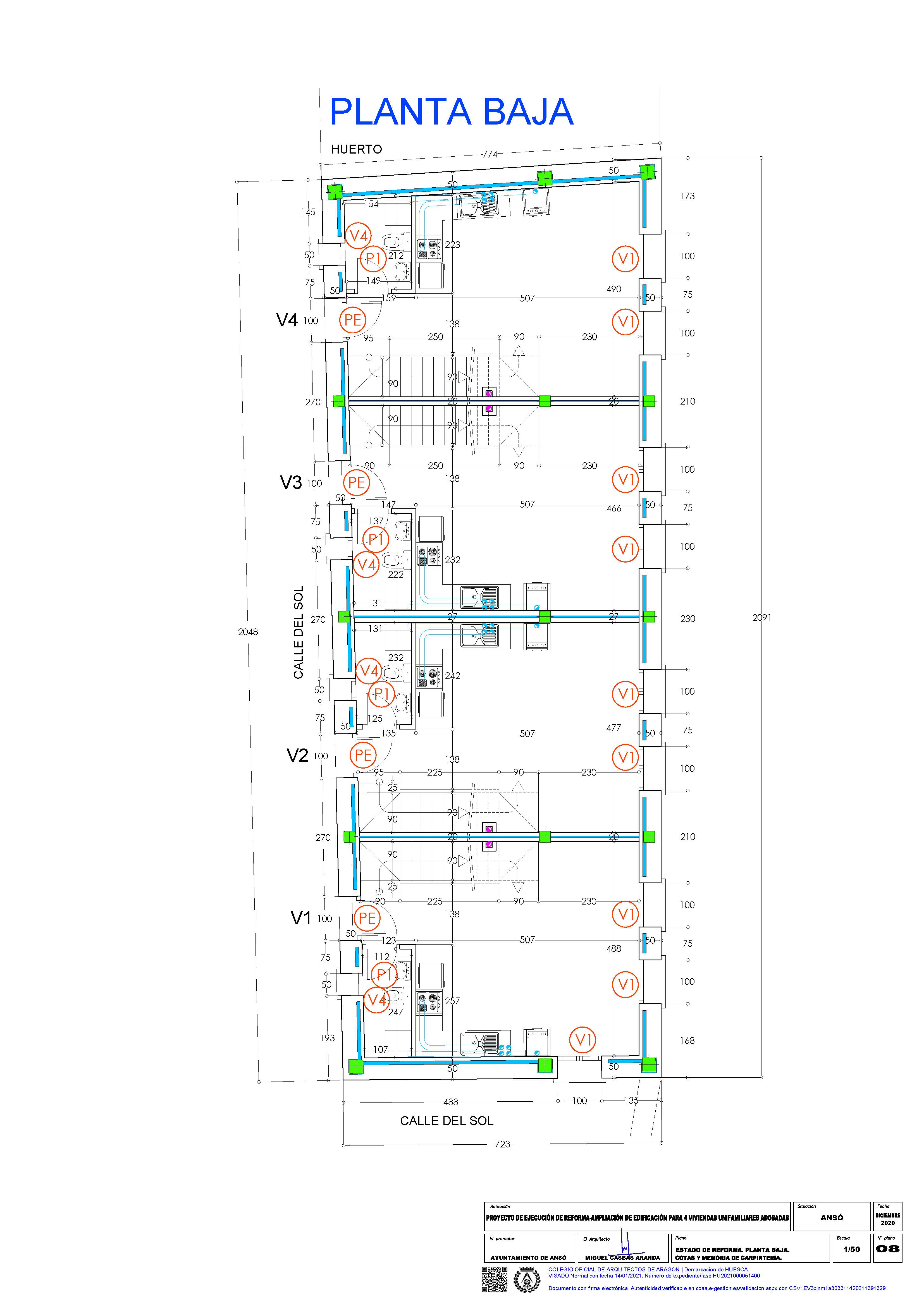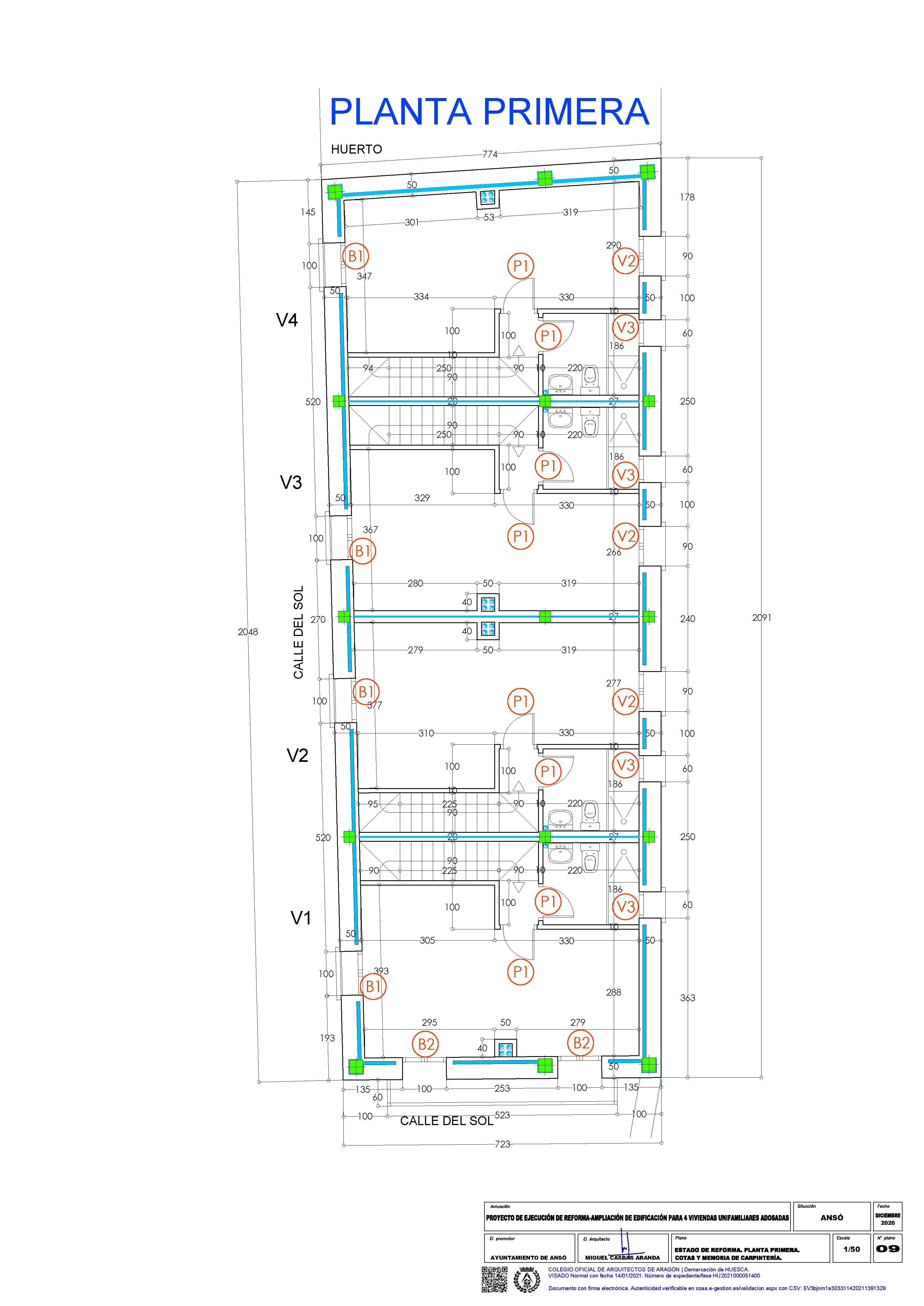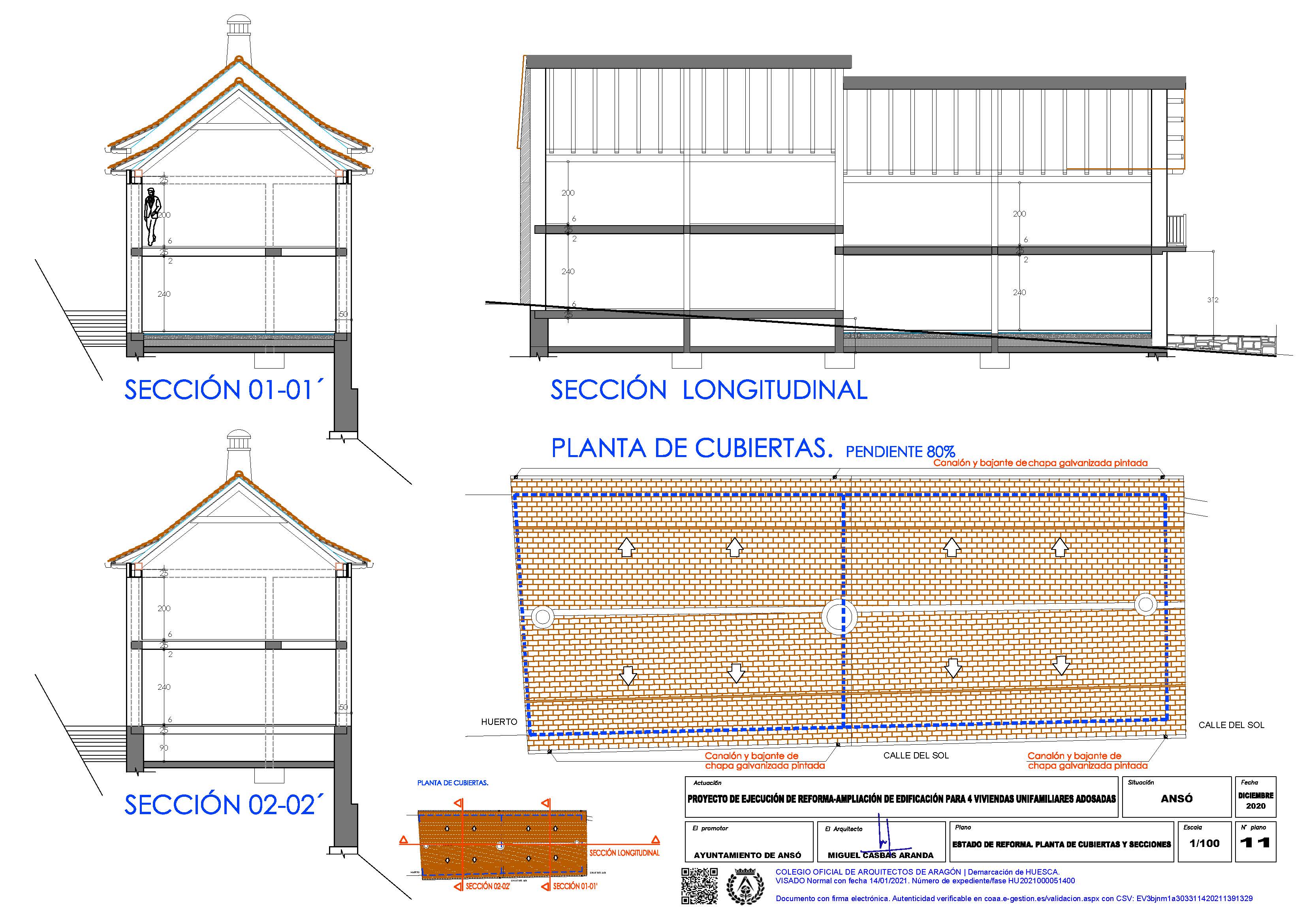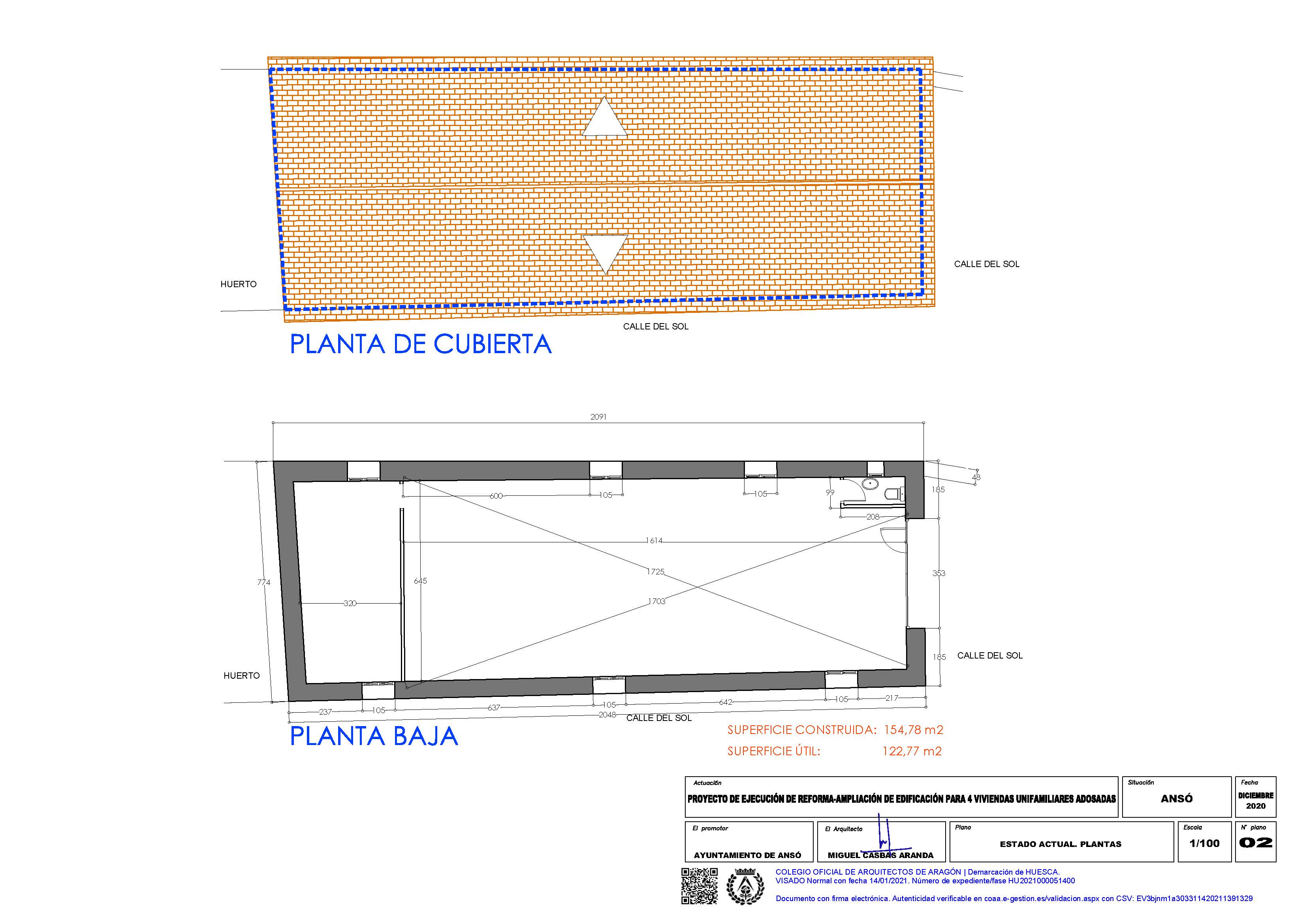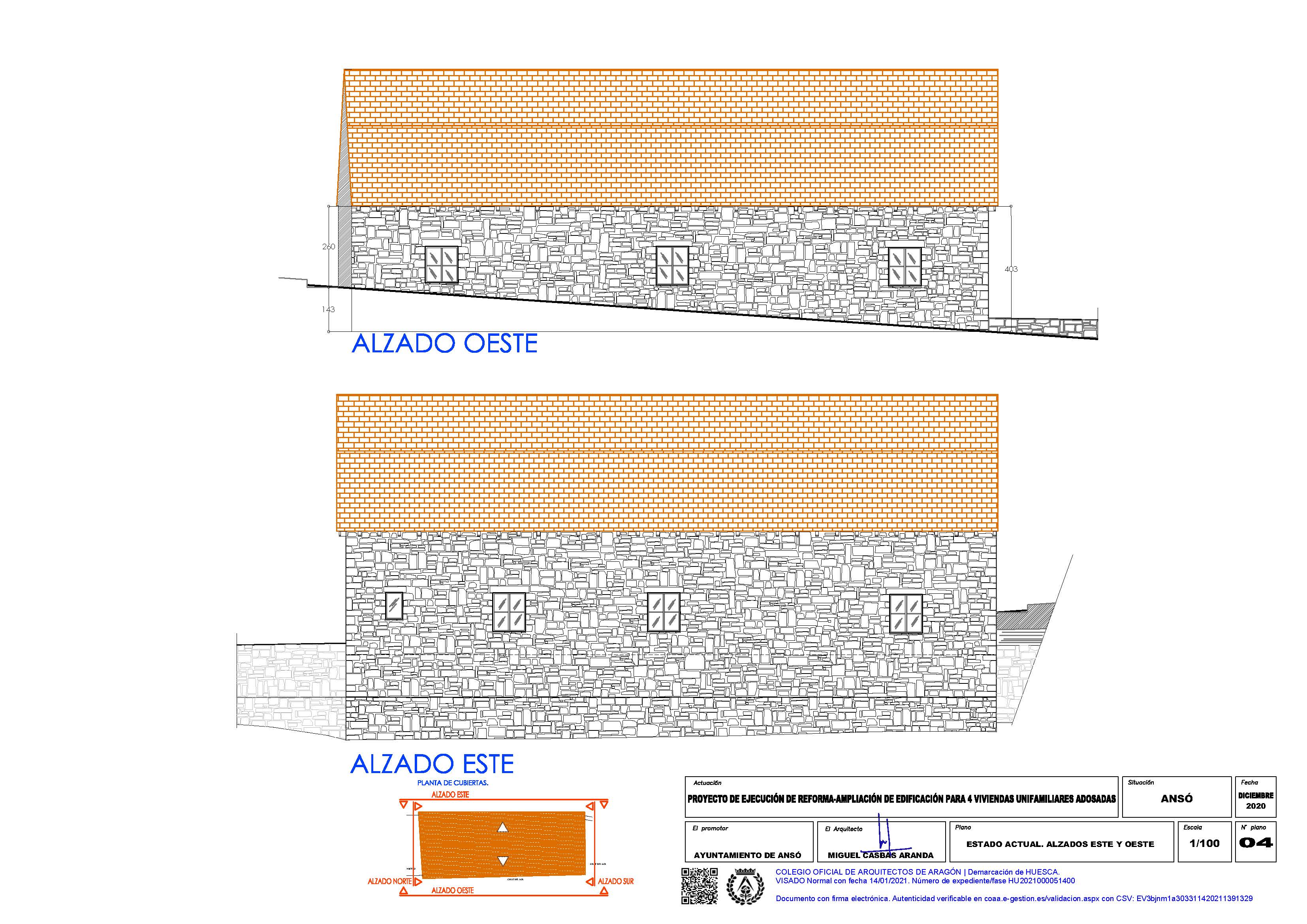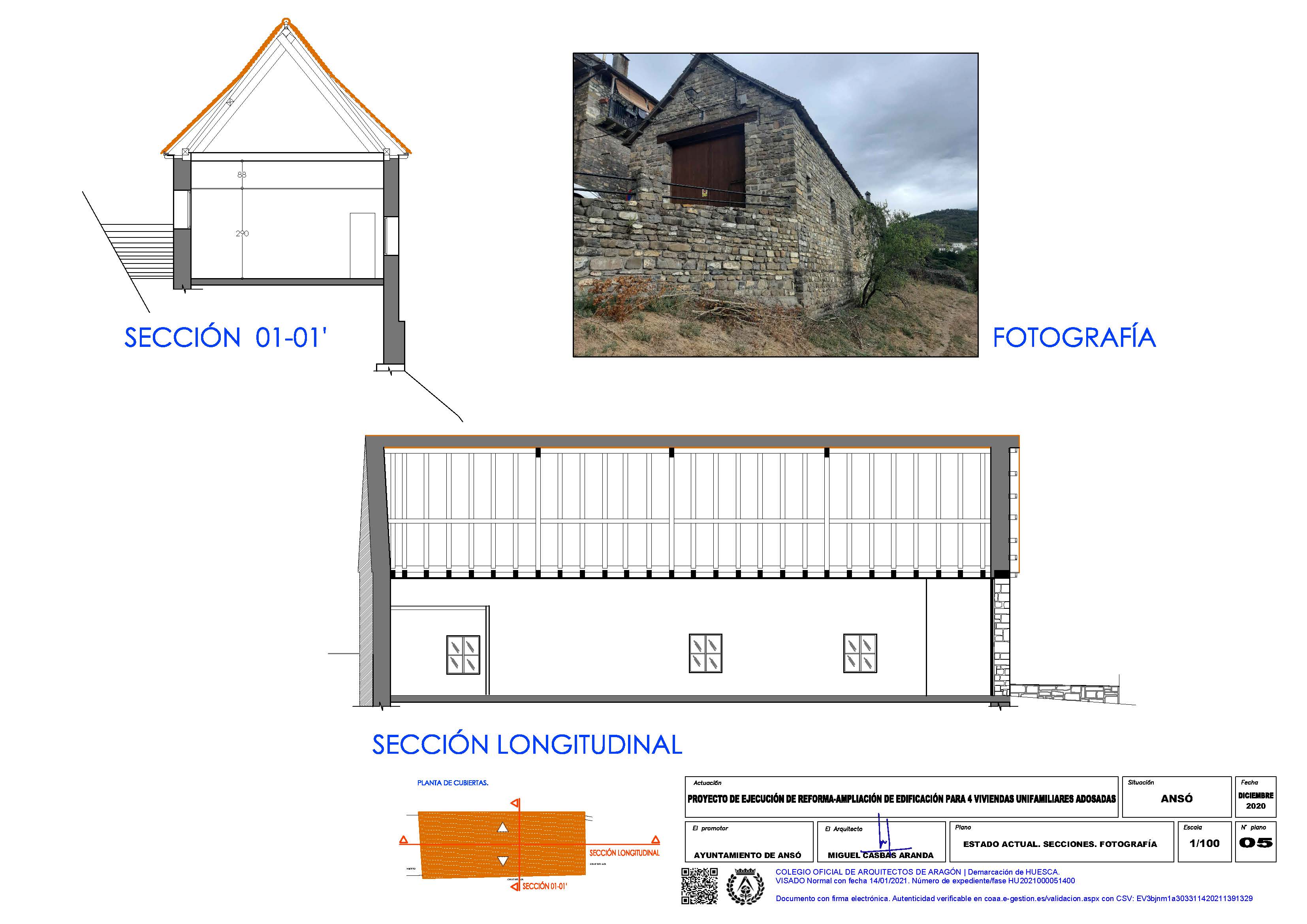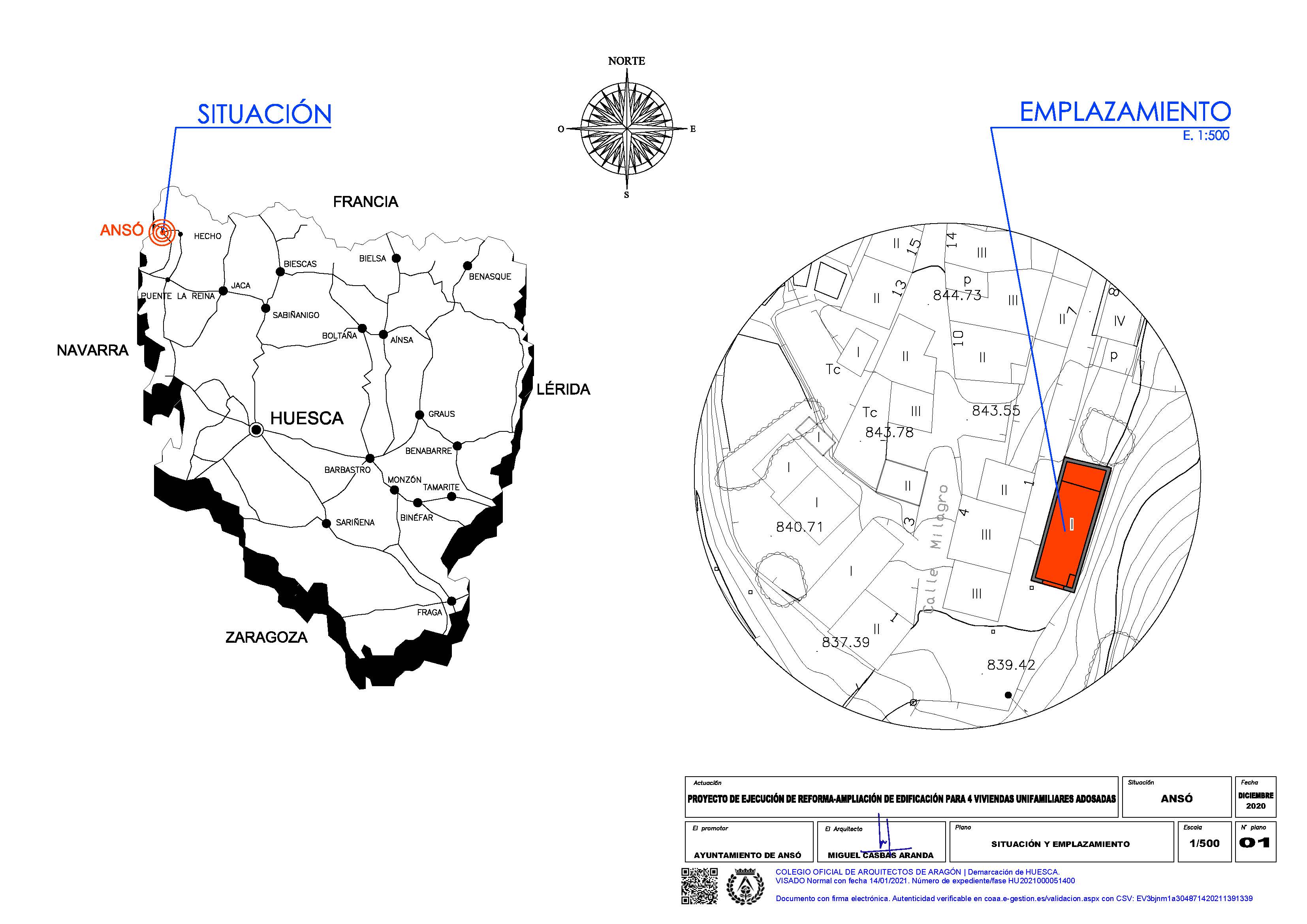Springboard Homes: A Sustainable Living
Springboard Homes in Ansó: Sustainable and Inclusive Housing for Rural Revitalization
Springboard Homes in Ansó offers newcomers a unique opportunity to experience rural life in a sustainable and inclusive way. Transforming an old municipal storage building into four energy-efficient homes, the initiative provides affordable housing for up to three years, free access to a coworking space, a community garden, and e-mobility facilities. Co-created with local residents, this project fosters community integration and supports rural revitalization through innovation and sustainability
Spain
C. del Sol, 2, 22728, Ansó, Huesca, Spain
Prototype level
Yes
Yes
Yes
Yes
NextGeneration EU
No
22028: Ansó (ES)
The Springboard Homes in Ansó initiative addresses rural depopulation, housing accessibility, and sustainable development by transforming an underutilized municipal building into affordable, energy-efficient housing. The project provides a low-risk opportunity for newcomers to experience rural living, fostering social and economic integration while promoting sustainability.
The initiative targets individuals and families interested in relocating to a rural environment but hesitant to commit long-term, remote workers, freelancers, and entrepreneurs seeking an alternative to urban life, and sustainability-conscious residents who value community-based energy solutions and local food production. It also benefits local residents and businesses, strengthening community ties and revitalizing the local economy.
Its main objectives include providing affordable, flexible housing through a three-year transitional residency model, allowing newcomers to explore rural living before making a long-term decision. The homes are connected to a local energy community, ensuring self-consumption of renewable energy and minimizing environmental impact. To support professional and social integration, residents receive free access to a municipal coworking space, enabling networking and economic participation. The initiative also promotes sustainable mobility, offering bicycle storage, EV charging stations, and a community garden, encouraging a low-carbon lifestyle and resource-sharing. Additionally, it prioritizes community participation, ensuring that local residents have a voice in the project’s development and fostering social cohesion.
Expected outcomes include an increased rural population, as the project lowers barriers for new residents, and enhanced sustainability practices through energy self-sufficiency, circular economy principles, and green mobility. By fostering economic engagement and social interaction, the initiative strengthens local business and community network.
The initiative targets individuals and families interested in relocating to a rural environment but hesitant to commit long-term, remote workers, freelancers, and entrepreneurs seeking an alternative to urban life, and sustainability-conscious residents who value community-based energy solutions and local food production. It also benefits local residents and businesses, strengthening community ties and revitalizing the local economy.
Its main objectives include providing affordable, flexible housing through a three-year transitional residency model, allowing newcomers to explore rural living before making a long-term decision. The homes are connected to a local energy community, ensuring self-consumption of renewable energy and minimizing environmental impact. To support professional and social integration, residents receive free access to a municipal coworking space, enabling networking and economic participation. The initiative also promotes sustainable mobility, offering bicycle storage, EV charging stations, and a community garden, encouraging a low-carbon lifestyle and resource-sharing. Additionally, it prioritizes community participation, ensuring that local residents have a voice in the project’s development and fostering social cohesion.
Expected outcomes include an increased rural population, as the project lowers barriers for new residents, and enhanced sustainability practices through energy self-sufficiency, circular economy principles, and green mobility. By fostering economic engagement and social interaction, the initiative strengthens local business and community network.
Sustainability
Inclusion
Rural Revitalization
Community Integration
Affordable Housing
The Springboard Homes in Ansó initiative embodies the New European Bauhaus (NEB) core value of sustainability by integrating energy efficiency, circular economy principles, and sustainable mobility into a community-driven housing model. The project aims to reduce environmental impact, promote self-sufficient energy solutions, and foster resource-conscious living, making it an exemplary case for sustainable rural revitalization.
A key sustainability objective is the adaptive reuse of an existing municipal building rather than new construction. By repurposing La Parada, the project minimizes material consumption, preserves local heritage, and reduces construction-related emissions, aligning with circular economy principles. This approach demonstrates how rural municipalities can revitalize underutilized spaces while maintaining environmental responsibility.
Another central goal is energy self-sufficiency. The homes are connected to a local energy community, ensuring that residents rely on renewable energy sources through self-consumption. This model reduces dependency on external energy grids, lowers carbon footprints, and promotes decentralized energy solutions that can be replicated in other municipalities.
The project also integrates sustainable mobility solutions, offering bicycle storage and EV charging stations to encourage low-carbon transportation. By prioritizing eco-friendly mobility, the initiative aligns with EU climate objectives and demonstrates how rural communities can adopt sustainable transport infrastructure.
Additionally, the initiative promotes local food sustainability through a shared community garden, encouraging self-sufficiency, biodiversity, and responsible land use. This fosters stronger community bonds while reducing dependence on external food systems.
A key sustainability objective is the adaptive reuse of an existing municipal building rather than new construction. By repurposing La Parada, the project minimizes material consumption, preserves local heritage, and reduces construction-related emissions, aligning with circular economy principles. This approach demonstrates how rural municipalities can revitalize underutilized spaces while maintaining environmental responsibility.
Another central goal is energy self-sufficiency. The homes are connected to a local energy community, ensuring that residents rely on renewable energy sources through self-consumption. This model reduces dependency on external energy grids, lowers carbon footprints, and promotes decentralized energy solutions that can be replicated in other municipalities.
The project also integrates sustainable mobility solutions, offering bicycle storage and EV charging stations to encourage low-carbon transportation. By prioritizing eco-friendly mobility, the initiative aligns with EU climate objectives and demonstrates how rural communities can adopt sustainable transport infrastructure.
Additionally, the initiative promotes local food sustainability through a shared community garden, encouraging self-sufficiency, biodiversity, and responsible land use. This fosters stronger community bonds while reducing dependence on external food systems.
The initiative integrates aesthetics and quality of experience by preserving local architectural identity, enhancing well-being through design, and fostering a sense of community. The project transforms a former municipal storage building (La Parada) into modern, energy-efficient townhouses, ensuring a harmonious blend of tradition and innovation while prioritizing human-centered design and cultural continuity.
A key objective is to maintain and repurpose the existing structure, ensuring that the homes respect the historical and visual character of Ansó. Instead of demolishing and rebuilding, the project adapts an underutilized space, demonstrating how rural municipalities can revitalize their built environment while preserving cultural heritage. The architectural design integrates natural materials, traditional forms, and energy-efficient solutions, creating a visually appealing and environmentally responsible living environment.
The homes are designed with human comfort and well-being in mind, ensuring ample natural light, functional layouts, and high-quality materials that enhance daily living. Shared green spaces, a community garden, and integrated coworking access further enrich the residents' experience, fostering a sense of belonging and promoting mental and social well-being.
By incorporating public and communal elements, the initiative strengthens social interaction and cultural exchange. The transformation of La Parada into a vibrant residential and communal space ensures that the project is not only practical and sustainable but also emotionally and culturally meaningful for both new and existing residents.
The initiative stands as an exemplary model of how small municipalities can create beautiful, sustainable, and socially enriching environments, proving that aesthetics, functionality, and cultural heritage can coexist to enhance the quality of life in rural settings.
A key objective is to maintain and repurpose the existing structure, ensuring that the homes respect the historical and visual character of Ansó. Instead of demolishing and rebuilding, the project adapts an underutilized space, demonstrating how rural municipalities can revitalize their built environment while preserving cultural heritage. The architectural design integrates natural materials, traditional forms, and energy-efficient solutions, creating a visually appealing and environmentally responsible living environment.
The homes are designed with human comfort and well-being in mind, ensuring ample natural light, functional layouts, and high-quality materials that enhance daily living. Shared green spaces, a community garden, and integrated coworking access further enrich the residents' experience, fostering a sense of belonging and promoting mental and social well-being.
By incorporating public and communal elements, the initiative strengthens social interaction and cultural exchange. The transformation of La Parada into a vibrant residential and communal space ensures that the project is not only practical and sustainable but also emotionally and culturally meaningful for both new and existing residents.
The initiative stands as an exemplary model of how small municipalities can create beautiful, sustainable, and socially enriching environments, proving that aesthetics, functionality, and cultural heritage can coexist to enhance the quality of life in rural settings.
The project is designed as an inclusive housing model, ensuring affordability, accessibility, and social integration for newcomers while fostering community participation and engagement. By removing economic and social barriers to rural living, the project provides a new societal model for small municipalities facing depopulation.
A key objective is affordability. Unlike traditional rural housing projects that require long-term commitment, Springboard Homes in Ansó offers a three-year transitional residency model, allowing individuals and families to experience rural life without the financial risks of permanent relocation. This low-cost rental model makes housing accessible to a diverse range of people, including young professionals, remote workers, and families seeking a lifestyle change.
The initiative also prioritizes social and professional inclusion. New residents receive free access to the municipal coworking space, enabling them to connect with local professionals, work remotely, or develop local businesses. This integration into the local economy fosters economic stability and professional networking, making rural living a viable and attractive option.
In terms of community participation, the project follows an inclusive governance approach. Local residents were actively involved in the decision-making process, shaping aspects such as residency duration, shared facilities, and sustainability features. This participatory model strengthens social cohesion, ensuring that the initiative benefits both newcomers and the existing community.
The initiative supports sustainable and inclusive living by providing shared spaces, a community garden, and sustainable mobility solutions. The integration of bicycle storage and EV charging stations ensures accessibility to eco-friendly transportation.
The project stands as a replicable model for inclusive, community-driven rural regeneration, making it an exemplary initiative for small municipalities.
A key objective is affordability. Unlike traditional rural housing projects that require long-term commitment, Springboard Homes in Ansó offers a three-year transitional residency model, allowing individuals and families to experience rural life without the financial risks of permanent relocation. This low-cost rental model makes housing accessible to a diverse range of people, including young professionals, remote workers, and families seeking a lifestyle change.
The initiative also prioritizes social and professional inclusion. New residents receive free access to the municipal coworking space, enabling them to connect with local professionals, work remotely, or develop local businesses. This integration into the local economy fosters economic stability and professional networking, making rural living a viable and attractive option.
In terms of community participation, the project follows an inclusive governance approach. Local residents were actively involved in the decision-making process, shaping aspects such as residency duration, shared facilities, and sustainability features. This participatory model strengthens social cohesion, ensuring that the initiative benefits both newcomers and the existing community.
The initiative supports sustainable and inclusive living by providing shared spaces, a community garden, and sustainable mobility solutions. The integration of bicycle storage and EV charging stations ensures accessibility to eco-friendly transportation.
The project stands as a replicable model for inclusive, community-driven rural regeneration, making it an exemplary initiative for small municipalities.
The Springboard Homes in Ansó initiative exemplifies the three main working principles of the New European Bauhaus (NEB)—participatory process, multi-level engagement, and transdisciplinary approach—by actively involving citizens, stakeholders, and experts in its development. The project follows a co-creation approach, ensuring that local residents played a key role in shaping the transformation of La Parada into a sustainable housing model. Through community meetings and consultations, inhabitants influenced decisions on key aspects such as the three-year residency model, shared facilities, and sustainability features, fostering a sense of ownership and long-term social cohesion.
The initiative integrates multi-level engagement, connecting local, regional, and EU actors to ensure policy alignment and long-term scalability. The municipality of Ansó, local businesses, and energy cooperatives collaborated to ensure that new residents were economically and socially integrated into the community. By aligning with regional and European strategies on rural repopulation and sustainability, the project demonstrates how small municipalities can implement innovative, future-oriented housing solutions.
A transdisciplinary approach was key to the initiative’s success, bringing together expertise from architecture, urban planning, renewable energy, and social inclusion. The integration of self-consumption renewable energy, shared coworking spaces, and sustainable mobility solutions reflects a holistic and forward-thinking design. By fostering participatory decision-making, cross-sector collaboration, and multi-level governance, Springboard Homes in Ansó serves as a replicable model for sustainable rural revitalization.
The initiative integrates multi-level engagement, connecting local, regional, and EU actors to ensure policy alignment and long-term scalability. The municipality of Ansó, local businesses, and energy cooperatives collaborated to ensure that new residents were economically and socially integrated into the community. By aligning with regional and European strategies on rural repopulation and sustainability, the project demonstrates how small municipalities can implement innovative, future-oriented housing solutions.
A transdisciplinary approach was key to the initiative’s success, bringing together expertise from architecture, urban planning, renewable energy, and social inclusion. The integration of self-consumption renewable energy, shared coworking spaces, and sustainable mobility solutions reflects a holistic and forward-thinking design. By fostering participatory decision-making, cross-sector collaboration, and multi-level governance, Springboard Homes in Ansó serves as a replicable model for sustainable rural revitalization.
The initiative is a multi-level collaboration involving stakeholders at local, regional, national, and European levels, ensuring an integrated approach to rural revitalization, sustainability, and social inclusion. This engagement has been essential for both the design and implementation of the project, allowing for a scalable and replicable model that aligns with broader policy frameworks.
At the local level, the Municipality of Ansó played a leading role in initiating and supporting the transformation of La Parada. The local community was actively involved through participatory meetings, shaping decisions on housing accessibility, residency duration, and shared community spaces. Local businesses, coworking spaces, and the energy cooperative also contributed, ensuring that the project was aligned with economic and environmental sustainability goals.
At the regional level, the initiative aligns with broader strategies for rural development and demographic revitalization. Collaboration with regional sustainability organizations and energy cooperatives enabled the project to integrate self-consumption renewable energy solutions, reducing environmental impact and promoting energy independence. The initiative also benefits from regional programs aimed at supporting affordable housing and sustainable mobility.
At the national level, the project aligns with government policies on rural repopulation, housing accessibility, and sustainable development. Partnerships with urban planning and sustainability experts ensured that the initiative followed best practices in architecture, circular economy, and social inclusion.
At the European level, the project reflects the core principles of the New European Bauhaus, integrating sustainability, inclusion, and aesthetics into a model for other small municipalities. By supporting EU Green Deal objectives, it demonstrates how rural communities can lead the transition towards greener, more inclusive living environments.
At the local level, the Municipality of Ansó played a leading role in initiating and supporting the transformation of La Parada. The local community was actively involved through participatory meetings, shaping decisions on housing accessibility, residency duration, and shared community spaces. Local businesses, coworking spaces, and the energy cooperative also contributed, ensuring that the project was aligned with economic and environmental sustainability goals.
At the regional level, the initiative aligns with broader strategies for rural development and demographic revitalization. Collaboration with regional sustainability organizations and energy cooperatives enabled the project to integrate self-consumption renewable energy solutions, reducing environmental impact and promoting energy independence. The initiative also benefits from regional programs aimed at supporting affordable housing and sustainable mobility.
At the national level, the project aligns with government policies on rural repopulation, housing accessibility, and sustainable development. Partnerships with urban planning and sustainability experts ensured that the initiative followed best practices in architecture, circular economy, and social inclusion.
At the European level, the project reflects the core principles of the New European Bauhaus, integrating sustainability, inclusion, and aesthetics into a model for other small municipalities. By supporting EU Green Deal objectives, it demonstrates how rural communities can lead the transition towards greener, more inclusive living environments.
The Springboard Homes in Ansó initiative integrates multiple disciplines and knowledge fields, ensuring a holistic and sustainable approach to rural housing and community revitalization. By bringing together architecture, urban planning, renewable energy, social inclusion, and economic development, the project creates a functional, environmentally responsible, and community-driven housing model.
Architecture and urban planning played a crucial role in designing the transformation of La Parada into energy-efficient, two-story homes while preserving the cultural and historical identity of the building. Urban planners collaborated with sustainability experts to integrate shared spaces, community gardens, and green mobility solutions, ensuring a well-balanced and livable environment.
Renewable energy and environmental sustainability were essential in implementing self-consumption energy solutions through a local energy community, reducing carbon footprints and promoting energy independence. Collaboration between engineers, sustainability consultants, and local energy cooperatives ensured the integration of efficient and accessible renewable energy infrastructure.
From a social inclusion perspective, experts in community engagement and rural development worked alongside the municipality to facilitate the integration of new residents. The provision of free access to the municipal coworking space was designed in collaboration with local businesses and economic development specialists, supporting professional networking and entrepreneurship.
The interaction between these diverse fields allowed for a transdisciplinary exchange, where sustainability, inclusion, and design worked together to create an innovative and replicable housing solution. This process ensured long-term success, environmental responsibility, and strong community support, making Springboard Homes in Ansó a leading example of integrated rural revitalization.
Architecture and urban planning played a crucial role in designing the transformation of La Parada into energy-efficient, two-story homes while preserving the cultural and historical identity of the building. Urban planners collaborated with sustainability experts to integrate shared spaces, community gardens, and green mobility solutions, ensuring a well-balanced and livable environment.
Renewable energy and environmental sustainability were essential in implementing self-consumption energy solutions through a local energy community, reducing carbon footprints and promoting energy independence. Collaboration between engineers, sustainability consultants, and local energy cooperatives ensured the integration of efficient and accessible renewable energy infrastructure.
From a social inclusion perspective, experts in community engagement and rural development worked alongside the municipality to facilitate the integration of new residents. The provision of free access to the municipal coworking space was designed in collaboration with local businesses and economic development specialists, supporting professional networking and entrepreneurship.
The interaction between these diverse fields allowed for a transdisciplinary exchange, where sustainability, inclusion, and design worked together to create an innovative and replicable housing solution. This process ensured long-term success, environmental responsibility, and strong community support, making Springboard Homes in Ansó a leading example of integrated rural revitalization.
The initiative introduces an innovative approach to rural housing and community integration, redefining how small municipalities can attract and retain new residents. Unlike traditional rural housing strategies that focus on permanent settlement with high entry barriers, this initiative provides a low-risk, transitional housing model, allowing newcomers to experience rural life before committing long-term.
One of its key innovations is the three-year residency model, offering individuals and families an opportunity to test rural living without the financial burden of long-term investments. This flexible approach contrasts with mainstream rural development programs, which often assume immediate permanence and lack transitional support.
The adaptive reuse of an existing municipal building (La Parada) is another innovative feature. Rather than constructing new homes, the project transforms an underutilized public asset into sustainable housing, reducing material consumption and environmental impact. This contrasts with conventional rural housing projects, which frequently focus on new construction rather than maximizing existing infrastructure.
Additionally, the project integrates renewable energy solutions by connecting the homes to a local energy community, ensuring self-consumption and energy independence. Unlike mainstream housing developments that rely on centralized energy grids, this initiative promotes decentralized, community-led energy solutions, aligning with EU sustainability goals.
Furthermore, Springboard Homes in Ansó is designed to support economic integration, offering free access to the municipal coworking space—a feature rarely included in rural housing projects. This ensures that newcomers are not only housed but also economically and socially integrated.
The initiative challenges traditional rural development models and establishes a new, flexible, and sustainable framework for rural revitalization.
One of its key innovations is the three-year residency model, offering individuals and families an opportunity to test rural living without the financial burden of long-term investments. This flexible approach contrasts with mainstream rural development programs, which often assume immediate permanence and lack transitional support.
The adaptive reuse of an existing municipal building (La Parada) is another innovative feature. Rather than constructing new homes, the project transforms an underutilized public asset into sustainable housing, reducing material consumption and environmental impact. This contrasts with conventional rural housing projects, which frequently focus on new construction rather than maximizing existing infrastructure.
Additionally, the project integrates renewable energy solutions by connecting the homes to a local energy community, ensuring self-consumption and energy independence. Unlike mainstream housing developments that rely on centralized energy grids, this initiative promotes decentralized, community-led energy solutions, aligning with EU sustainability goals.
Furthermore, Springboard Homes in Ansó is designed to support economic integration, offering free access to the municipal coworking space—a feature rarely included in rural housing projects. This ensures that newcomers are not only housed but also economically and socially integrated.
The initiative challenges traditional rural development models and establishes a new, flexible, and sustainable framework for rural revitalization.
The initiative follows a participatory, sustainability-driven, and multi-disciplinary approach, ensuring a holistic and replicable model for rural revitalization. The methodology integrates community engagement, adaptive reuse of infrastructure, and renewable energy solutions, prioritizing affordability, environmental responsibility, and social inclusion.
A key component of the approach is active community participation. The Municipality of Ansó engaged local residents in public consultations, allowing them to shape the project’s design and purpose. This co-creation process ensured that the initiative aligned with local needs and aspirations, fostering a sense of community ownership and long-term sustainability.
Instead of constructing new buildings, the project repurposes an existing municipal facility (La Parada), minimizing environmental impact while preserving local architectural heritage. The transformation into energy-efficient, two-story townhouses aligns with circular economy principles, demonstrating how municipalities can revitalize underutilized spaces cost-effectively and sustainably.
The homes are connected to a local energy community, ensuring self-consumption of renewable energy and reducing reliance on external grids. This decentralized energy model enhances climate resilience while promoting community-driven sustainability initiatives. The initiative also promotes sustainable mobility, incorporating EV charging stations and secure bicycle storage, supporting low-carbon transportation.
Unlike traditional rural housing projects, Springboard Homes in Ansó links housing with economic opportunities by providing free access to the municipal coworking space, allowing residents to integrate professionally and socially. By combining community-led planning, circular economy, and renewable energy, the initiative redefines rural housing as a flexible, affordable, and sustainable solution for demographic and economic revitalization.
A key component of the approach is active community participation. The Municipality of Ansó engaged local residents in public consultations, allowing them to shape the project’s design and purpose. This co-creation process ensured that the initiative aligned with local needs and aspirations, fostering a sense of community ownership and long-term sustainability.
Instead of constructing new buildings, the project repurposes an existing municipal facility (La Parada), minimizing environmental impact while preserving local architectural heritage. The transformation into energy-efficient, two-story townhouses aligns with circular economy principles, demonstrating how municipalities can revitalize underutilized spaces cost-effectively and sustainably.
The homes are connected to a local energy community, ensuring self-consumption of renewable energy and reducing reliance on external grids. This decentralized energy model enhances climate resilience while promoting community-driven sustainability initiatives. The initiative also promotes sustainable mobility, incorporating EV charging stations and secure bicycle storage, supporting low-carbon transportation.
Unlike traditional rural housing projects, Springboard Homes in Ansó links housing with economic opportunities by providing free access to the municipal coworking space, allowing residents to integrate professionally and socially. By combining community-led planning, circular economy, and renewable energy, the initiative redefines rural housing as a flexible, affordable, and sustainable solution for demographic and economic revitalization.
The Springboard Homes in Ansó initiative has high potential for transferability and replicability, offering a scalable model for rural revitalization through affordable, sustainable, and community-integrated housing. Its methodology, energy model, and participatory governance structure can be adapted to other small municipalities, urban transition zones, or regional repopulation strategies across Europe.
One of the most transferable elements is the three-year transitional housing model, which provides a low-risk, flexible alternative to traditional rural relocation. By allowing newcomers to experience rural life before making a long-term commitment, this model reduces economic barriers and attracts diverse demographics, including young professionals, remote workers, and families.
The adaptive reuse of existing municipal buildings is another replicable feature. Many small towns have underutilized public infrastructure that could be transformed into energy-efficient housing instead of constructing new developments. This approach reduces environmental impact, optimizes local resources, and preserves cultural heritage, making it an economically viable and sustainable solution.
The integration of renewable energy through local energy communities is a scalable model for municipalities aiming for energy self-sufficiency. By linking affordable housing with decentralized renewable energy systems, this initiative demonstrates how small communities can achieve climate resilience and contribute to EU Green Deal objectives.
Additionally, the participatory governance model, where local residents are actively involved in decision-making, can be replicated to ensure community support and long-term sustainability. By combining affordable housing, sustainability, and community participation, Springboard Homes in Ansó serves as a replicable solution for rural and urban regions seeking innovative approaches to housing and demographic revitalization.
One of the most transferable elements is the three-year transitional housing model, which provides a low-risk, flexible alternative to traditional rural relocation. By allowing newcomers to experience rural life before making a long-term commitment, this model reduces economic barriers and attracts diverse demographics, including young professionals, remote workers, and families.
The adaptive reuse of existing municipal buildings is another replicable feature. Many small towns have underutilized public infrastructure that could be transformed into energy-efficient housing instead of constructing new developments. This approach reduces environmental impact, optimizes local resources, and preserves cultural heritage, making it an economically viable and sustainable solution.
The integration of renewable energy through local energy communities is a scalable model for municipalities aiming for energy self-sufficiency. By linking affordable housing with decentralized renewable energy systems, this initiative demonstrates how small communities can achieve climate resilience and contribute to EU Green Deal objectives.
Additionally, the participatory governance model, where local residents are actively involved in decision-making, can be replicated to ensure community support and long-term sustainability. By combining affordable housing, sustainability, and community participation, Springboard Homes in Ansó serves as a replicable solution for rural and urban regions seeking innovative approaches to housing and demographic revitalization.
The initiative addresses global challenges related to rural depopulation, housing affordability, climate change, and social integration by implementing local, community-driven solutions that can be replicated in similar contexts.
One of the key global challenges tackled by the initiative is rural depopulation and demographic decline, a widespread issue across Europe. By offering affordable, flexible housing with a three-year transitional model, the initiative lowers economic barriers and encourages new residents to experience rural living, helping reverse urban migration trends. This approach supports balanced territorial development and fosters social and economic regeneration in small municipalities.
Another major challenge is climate change and energy sustainability. The project incorporates renewable energy through a local energy community, promoting self-consumption and reducing dependence on fossil fuels. This model contributes to the EU Green Deal objectives, demonstrating how small communities can lead in the transition to clean energy. Additionally, EV charging stations and bicycle-friendly infrastructure promote low-carbon mobility, further reducing environmental impact.
The initiative also addresses the global housing crisis by demonstrating how underutilized municipal buildings can be repurposed into energy-efficient, affordable homes. This adaptive reuse model provides an alternative to new construction, reducing material waste and preserving local heritage.
Additionally, the project fosters social inclusion and economic integration by providing free access to a municipal coworking space, allowing residents to connect with local professionals and businesses. By strengthening community engagement and participatory governance, the initiative enhances social resilience and ensures that newcomers and long-term residents benefit equally.
One of the key global challenges tackled by the initiative is rural depopulation and demographic decline, a widespread issue across Europe. By offering affordable, flexible housing with a three-year transitional model, the initiative lowers economic barriers and encourages new residents to experience rural living, helping reverse urban migration trends. This approach supports balanced territorial development and fosters social and economic regeneration in small municipalities.
Another major challenge is climate change and energy sustainability. The project incorporates renewable energy through a local energy community, promoting self-consumption and reducing dependence on fossil fuels. This model contributes to the EU Green Deal objectives, demonstrating how small communities can lead in the transition to clean energy. Additionally, EV charging stations and bicycle-friendly infrastructure promote low-carbon mobility, further reducing environmental impact.
The initiative also addresses the global housing crisis by demonstrating how underutilized municipal buildings can be repurposed into energy-efficient, affordable homes. This adaptive reuse model provides an alternative to new construction, reducing material waste and preserving local heritage.
Additionally, the project fosters social inclusion and economic integration by providing free access to a municipal coworking space, allowing residents to connect with local professionals and businesses. By strengthening community engagement and participatory governance, the initiative enhances social resilience and ensures that newcomers and long-term residents benefit equally.
The initiative has demonstrated a strong commitment to implementation, with key milestones already achieved, including securing a loan from the Government of Aragón to finance the project. This funding ensures that the initiative moves forward as a sustainable, inclusive, and community-driven housing solution, aligned with New European Bauhaus (NEB) values and principles.
The project has already incorporated NEB principles through a participatory design process, ensuring that local residents had a say in shaping the initiative. The adaptive reuse of the former municipal building (La Parada) into four energy-efficient townhouses is underway, promoting circular economy principles and sustainable architecture. The integration of renewable energy via a local energy community, EV charging stations, and bicycle storage reinforces environmental responsibility and low-carbon mobility.
The next steps focus on finalizing construction and fully implementing sustainability measures. This includes ensuring energy efficiency and comfort, establishing the three-year transitional residency model, and strengthening community integration through access to the municipal coworking space and shared public areas.
A marketing campaign will promote Springboard Homes in Ansó, ensuring a transparent selection process. It will target professionals, families, and entrepreneurs through digital outreach, informational events, and collaboration with regional and national networks. The goal is to attract diverse applicants who align with the project's sustainability and community values.
By maintaining a transdisciplinary approach, fostering collaboration at multiple levels, and ensuring long-term sustainability, Springboard Homes in Ansó stands as a replicable model for rural revitalization, demonstrating how small municipalities can drive social, economic, and environmental transformation.
The project has already incorporated NEB principles through a participatory design process, ensuring that local residents had a say in shaping the initiative. The adaptive reuse of the former municipal building (La Parada) into four energy-efficient townhouses is underway, promoting circular economy principles and sustainable architecture. The integration of renewable energy via a local energy community, EV charging stations, and bicycle storage reinforces environmental responsibility and low-carbon mobility.
The next steps focus on finalizing construction and fully implementing sustainability measures. This includes ensuring energy efficiency and comfort, establishing the three-year transitional residency model, and strengthening community integration through access to the municipal coworking space and shared public areas.
A marketing campaign will promote Springboard Homes in Ansó, ensuring a transparent selection process. It will target professionals, families, and entrepreneurs through digital outreach, informational events, and collaboration with regional and national networks. The goal is to attract diverse applicants who align with the project's sustainability and community values.
By maintaining a transdisciplinary approach, fostering collaboration at multiple levels, and ensuring long-term sustainability, Springboard Homes in Ansó stands as a replicable model for rural revitalization, demonstrating how small municipalities can drive social, economic, and environmental transformation.

